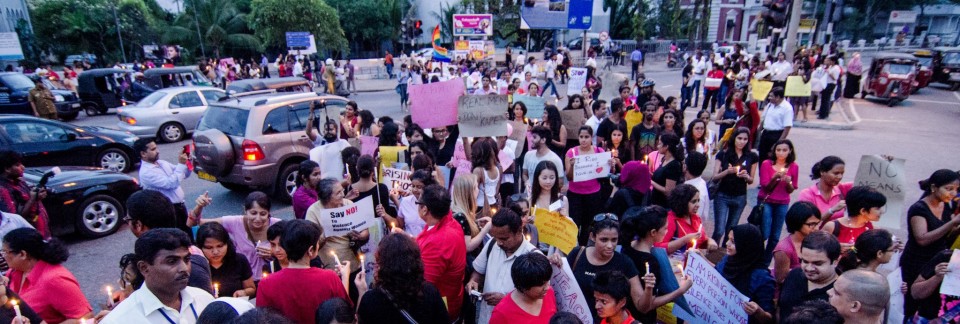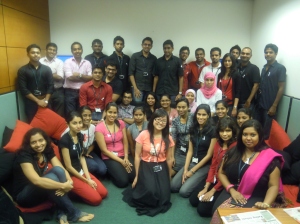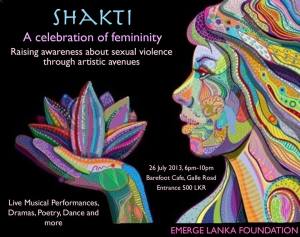Reproduced from IMPOWR and ACT NOW
—
Constitution
Sri Lanka’s Constitution provides a general protection against violence.
Article 11 guarantees that “no person shall be subjected to harassment, or inhuman and cruel treatment or punishment.”¹
Penal Code
The Penal Code of Sri Lanka enacted as Ordinance N°2 of 1883 contains the country’s most significant criminal law statute. The Sri Lankan government has amended the Ordinance 30 times since independence in 1948.
Legal definition of rape
Article 363 of the Penal Code defines rape as sexual intercourse with a woman in five specific scenarios:
(1) sexual intercourse without consent;
(2) sexual intercourse even with consent where the woman is in lawful or unlawful detention or where consent is obtained through intimidation, threat, or force;
(3) sexual intercourse where consent has been obtained when the woman is of unsound mind or in a state of intoxication administered to her by the man or some other person;
(4) sexual intercourse where the woman has consented because she believes she is married to the man;
(5) sexual intercourse with or without consent if the woman is under 16 years of age unless the woman is the accused man’s wife, she is over 12 years of age, and she is not judicially separated from the accused.²
Penetration constitutes sexual intercourse for the purposes of Article 363.³
Assault with the intention of committing rape is one of the few circumstances in Sri Lankan law where the right of defense extends to killing the assailant.
Marital Rape
Marital rape is not a crime in Sri Lanka unless a judge has ordered a spousal separation. The 2005 Prevention of Domestic Violence Act (PDVA) provides some protection. The PDVA allows victims of domestic violence (including rape and sexual assault) to request a protective order from a Magistrate’s Court that would limit contact between the perpetrator and the victim.
Custodial Rape and Gang Rape
Section 364(2) of Sri Lanka’s Penal Code includes provisions that recognize custodial rape and gang rape as graver forms of rape. The Penal Code lists gang rape and custodial rape as aggravating circumstances for sentencing.
Custodial Rape
The Penal Code outlines three specific scenarios for custodial rape:
(1) acts committed by public officers or persons in positions of authority against women in official custody or against women who have been wrongly restrained;
(2) acts committed by a person on the management or staff of a home or other place of custody established by law against women inmates;
(3) acts committed by a person on the management or staff of a hospital against a woman in the hospital, a pregnant woman in the hospital, a woman under 18 years of age in the hospital, or a mentally or physically disabled person in the hospital.
In 1995 President Chandrika Kumaratunga, issued a directive to prevent torture, disappearances, and sexual violence in custody. The directive allows women and children under 12 to bring a person of their choice to police or security force questioning. Although reports of custodial rape by armed forces personnel and the police increased during the war, Sri Lanka has seen very few prosecutions for custodial rape.
There are exceptions to the rule.
Case of Vijitha Yogalingum
In 2000, police tortured and raped Vijitha Yogalingum on a falsified report that she was a member of the Liberation Tigers of Tamil Eelam (LTTE) suicide bomb squad. In 2001, Yogalingum filed a fundamental rights petition with the Supreme Court and in August 2002 the Supreme Court found that 7 respondents had violated her fundamental rights under Article 11 of Sri Lanka’s Constitution. The Supreme Court ordered each respondent to pay compensation to the victim and the judges urged the Attorney General to take steps to punish the perpetrators.
Gang Rape
Under the Penal Code a gang rape occurs where the offence of rape is committed by one or more persons in a group of persons, where each person in such a group commits or abets the commission of the rape.
Unnatural Offenses and Grave Sexual Abuse
Article 365 of Sri Lanka’s Penal Code defines unnatural offenses and grave sexual abuse. The Code enumerates penalties for individuals who “voluntarily have carnal intercourse against the order of nature with any man, woman, or animal” but does not define specific acts that violate the order of nature.
Section 365B states broadly that grave sexual abuse amounts to nonconsensual acts committed for sexual gratification that do not amount to rape under Article 363.
Perpetrators of grave sexual abuse receive 5 to 20 years of rigorous imprisonment and must pay compensation to the victim. Rigorous imprisonment is defined as imprisonment with hard labor. The Penal Code outlines longer sentences when the grave sexual abuse victim is a minor.
Consent
The official explanation of Article 363 specifies that evidence of resistance is unnecessary to prove that the victim did not consent. The Penal Code outlines specific instances where consent is impossible:
(1) where consent is obtained while in lawful or unlawful detention;
(2) where a perpetrator uses force, threats, or intimidation;
(3) where a victim is of unsound mind or in a state of intoxication induced by alcohol or drugs administered to her by a person other than herself.
Jurisprudence has since clarified the definition of consent. Although the law does not require evidence of resistance to prove that sex was nonconsensual, in the Kamal Addararatchichi case, the Supreme Court upheld a ruling that victims of rape must show evidence of struggle to prove a lack of consent. In this case, the victim sustained no demonstrable injuries, so the Supreme Court found that she had consented to the sexual act.
In 1995, the Sri Lankan government raised the legal age of consent from 12 to 16. Consent is immaterial for statutory rape, but a court will consider consent in sentencing.
Sentencing
The 1995 amendments also include mandatory minimum sentences for rape, gross sexual abuse, and acts of gross indecency. A High Court has since found that these mandatory minimums violate Sri Lanka’s Constitution. The CEDAW NGO Shadow Report concludes that this decision has increased impunity in cases of rape and violence against women because High Courts are issuing suspended or reduced sentences in rape cases.
Article 346 of Sri Lanka’s Penal Code allows mitigating defenses for sexual assault and rape including “grave and sudden provocation.”
1998 Amendment: New Offences
The most recent amendments in 1995 and 1998 include several important changes to the elements and punishments for sex-based crimes.
Added offenses include:
Sexual Harassment
According to Article 12 (2) of the Constitution, discriminating against a person based on his or her sex is a violation of such person’s fundamental right to equality.
Sexual harassment is criminally punishable under Section 345 of the Penal Code (Amendment) Act, No. 22 of 1995.
Sexual harassment constitutes “Harassment of a sexual nature using assault, criminal force, or words or actions which causes annoyance to the person being harassed.” This includes:
- Unwelcome sexual advances by words or action used by a person in authority (eg. Police, armed service personnel, school officials, medical officials etc.).
- Unwelcome sexual advances in the work place.
- Sexual harassment in the Penal Code may cover misuse of internet and emails that are obscene or make allegations of a sexual nature in order to harass, intimidate or embarrass.
Encouraging or condoning sexual harassment is also a crime under the law.
Under the Prohibition of Ragging and other forms of Violence in Educational Institutions Act, No. 20 of 1998, if a person causes sexual harassment while ragging any student or a member of the staff of an educational institution he or she will be given a minimum punishment of ten (10) years and may also be ordered to pay compensation of an amount determined by court.
Grave Sexual Abuse
Adults – Grave sexual abuse is a criminal offence under Section 365B of the Penal Code (Amendment) Act, No 22 of 1995 and includes all sexual acts without consent that do not come within the definition of rape.
This includes instances where a sexual act is not only through the use of genitals or parts of the human body but also through any instrument and also on any orifice or part of the body of another person.
Grave sexual abuse may include, non consensual,
- Oral sex
- Manual stimulation
- Sado masochistic sexual conduct using instruments
The minimum punishment is rigorous imprisonment for no less than 5 years which may extend to 20 years with a fine. Court may also order compensation.
Statutory Grave Sexual Abuse (for minors under 16 years old)
Children – If the victim-survivor is under the age of 16 years it is assumed that the sexual act is done without the consent of the victim-survivor.
Punishment may include rigorous imprisonment for no less than 7 years and not exceeding 20 years. Court may order the perpetrator to pay compensation.
Incest ²7
The law on incest is found in Section 364A of the Penal Code (Amendment) Act, No. 22 of 1995. Where a person has sexual intercourse with another person who is related in any of the following ways, it constitutes incest:
- Where the offender and the victim are directly descended from the other (that is father/daughter)
- Where the perpetrator is the adoptive parent, adoptive grand parent, and the victim is the adopted child or adopted grand child of the other
- The female, who is the victim, is the sister of the male by full or half blood or by adoption
- The female is a descendant from either of them
- Where the male is the brother of the female either by full or half blood or by adoption
- Where the male is the son of the victim’s brother or sister (that is the nephew) by full or half blood or by adoption or is a descendant from either of them
- Where the male is the son of her husband by another mother (that is a step son)
- Where the male is, or is her deceased daughter’s or grand daughter’s or mother’s or grand mother’s husband.
Obscene Publication
Sexual Exploitation of Children
Trafficking
The main trafficking law is found in Section 360C of the Penal Code (Amendment) Act, No. 16 of 2006. According to this section,
- Anyone who buys, sells or barters another person for money or any other benefit commits the criminal offence of trafficking.
- A person who instigates or helps another person to buy, sell or barter any person too is guilty of the crime of trafficking.
- Doing anything to promote, facilitate or induce the buying, selling or bartering of any person is also a crime.
- Recruiting, transporting, transferring, harbouring or receiving persons hoping to use them as forced labour, slaves, for their organs, prostitution or any other form of sexual exploitation is a crime.
- Threatening, forcing, misleading or exploiting the vulnerability in order to push someone into forced labour, slavery, prostitution, selling their organs is a criminal offence.
- When it comes to children, the fact that the child has given consent or not, is immaterial.
The 2006 Amendment to the Penal Code draws on the language of the international instrument known as the Palermo Protocol. However, the Protocol definition is broader. The Sri Lankan Penal Code provisions do not state that in the case of an adult consent is not relevant.
The punishment for trafficking an adult is imprisonment up to 20 years and a fine. The punishment for trafficking a child is imprisonment for more than 3 years and up to 20 years and a fine.
Hiring or employing children to act as procurers for sexual intercourse
Non-reporting by developers of photographs/film who discover obscene or indecent photographs of children
Publication of materials regarding certain sexual offenses
Digital Violence
Penal Code (Amendment) Act, No. 16 of 2006
In recognizing the importance of laws to curb cyber violence, in 2006 Sri Lanka introduced an amendment to the Penal Code which placed a ‘duty of person providing service by computer to prevent sexual abuse of a child’.
Section 286B (1) states that such person who provides a service by means of a computer was charged with taking all steps necessary to ensure that such computer facility is not used to carry out an act constituting an offence relating to the sexual abuse of a child.
Section 286B (2) states that information on this offence should be reported to the nearest police station.
The punishment for violation of this law is imprisonment not exceeding two years or a fine or both imprisonment and fine.
Computer Crime Act, No. 24 of 2007 deals primarily with computer related crimes and hacking offences. The Act criminalises attempts at unauthorized access to a computer or any information held in any computer, and the commission of any other offence. This Act does not deal with content related offences such as pornography and harassment perpetrated via ICT tools.
1. The Constitution of the Republic of Sri Lanka [Const.] art. 11.
2. Penal Code art. 363 (Sri Lanka).
3. Penal Code Explanation of art. 363 (i) (Sri Lanka).
4. Penal Code art. 93 (Sri Lanka).
5. The Prevention of Domestic Violence Act N. 34 of 2005 (2005) art. 2(1) (Sri Lanka).
6. Penal Code art. 364(2) (Sri Lanka).
7. Id.
8. Establishment of the Human Rights Task Force Regulation, Regulation 8 No. 1, 1995 (Sri Lanka).
9. Sri Lanka Shadow Report to the Committee on the Elimination of All Forms of Discrimination Against Women (July 2010) 41, available athttp://www.womenandmedia.net/legal_statements/Sri_Lanka_NGO_Shadow_Report_to_CEDAW_July_2010.pdf.
10. Yogalingum Vijitha v. Wijesekara and 8 others, Supreme Court Application No. 186/2001 (Aug. 28, 2002).
11. The Constitution of the Republic of Sri Lanka [Const.] art. 11. Article 11 guarantees freedom from torture or cruel, inhuman or degrading treatment.
12. See Yogalingum Vijitha v. Wijesekara and 8 others, Application No. 186/2001.
13. Penal Code Explanation of art. 363 (Sri Lanka).
14. Id. at art. 365 (Sri Lanka).
15. Id. at art. 356(B).
16. Id. at art. 52 (a).
17. Id. at art. 363 (Sri Lanka).
18. Addara Aratchige Gunendra Kamal alias Kamal Addararatchi Vs. The Republic, High Court Case 7710/96, Court of Appeal Case 90/97, Supreme Court Leave to Appeal 30/2001.
19. Sri Lanka Shadow Report, supra note 9, at 9; Penal Code Section 363(e) as amended by Act No. 22 of 1995 (Sri Lanka).
20. High Court of the North Central Province, Case No.HC.333/04 Supreme Court (30/2008) (Sri Lanka) ruling that the mandatory sentence conflicts with arts. 4(c), 11, and 12 of the Constitution; See also Sarath Malalasekera, HC not inhibited from imposing sentence it deems appropriate in exercise of judicial discretion- Justice P.A. Ratnayake, The Daily News (Oct. 21, 2008) http://www.dailynews.lk/2008/10/21/news30.asp; Sri Lanka Shadow Report, supra note 9, at 36.
21. Sri Lanka Shadow Report, supra note 9, at 36.
22. Penal Code art. 346 (Sri Lanka).
23. Penal Code art. 363(B) (Sri Lanka).
24. Id. at art. 345.
25. http://www.actnowsrilanka.org/en/vaw/grave-sexual-abuse#laws
26. Id. at art. 365 (B) (1)(a)(aa).
27. Id. at art. 364 (A).
28. Id. at art. 286 (A)
29. Id. at art. 360 (B).
30. Id. at art. 360 (C).
31. Id. at art. 288 (A).
32. Id. at art. 286 (A).
33. Id. at art. 365 (C).
 We are deeply saddened by the loss of Sunila Abeysekera who, among many other things, was a tireless human rights activist and an important member of the women’s movement in Sri Lanka. She will be remembered not just for what she did, but for the amazing individual she was. Her work and voice have inspired us for decades, and will continue to do so in the years to come. She will be sorely missed.
We are deeply saddened by the loss of Sunila Abeysekera who, among many other things, was a tireless human rights activist and an important member of the women’s movement in Sri Lanka. She will be remembered not just for what she did, but for the amazing individual she was. Her work and voice have inspired us for decades, and will continue to do so in the years to come. She will be sorely missed.


